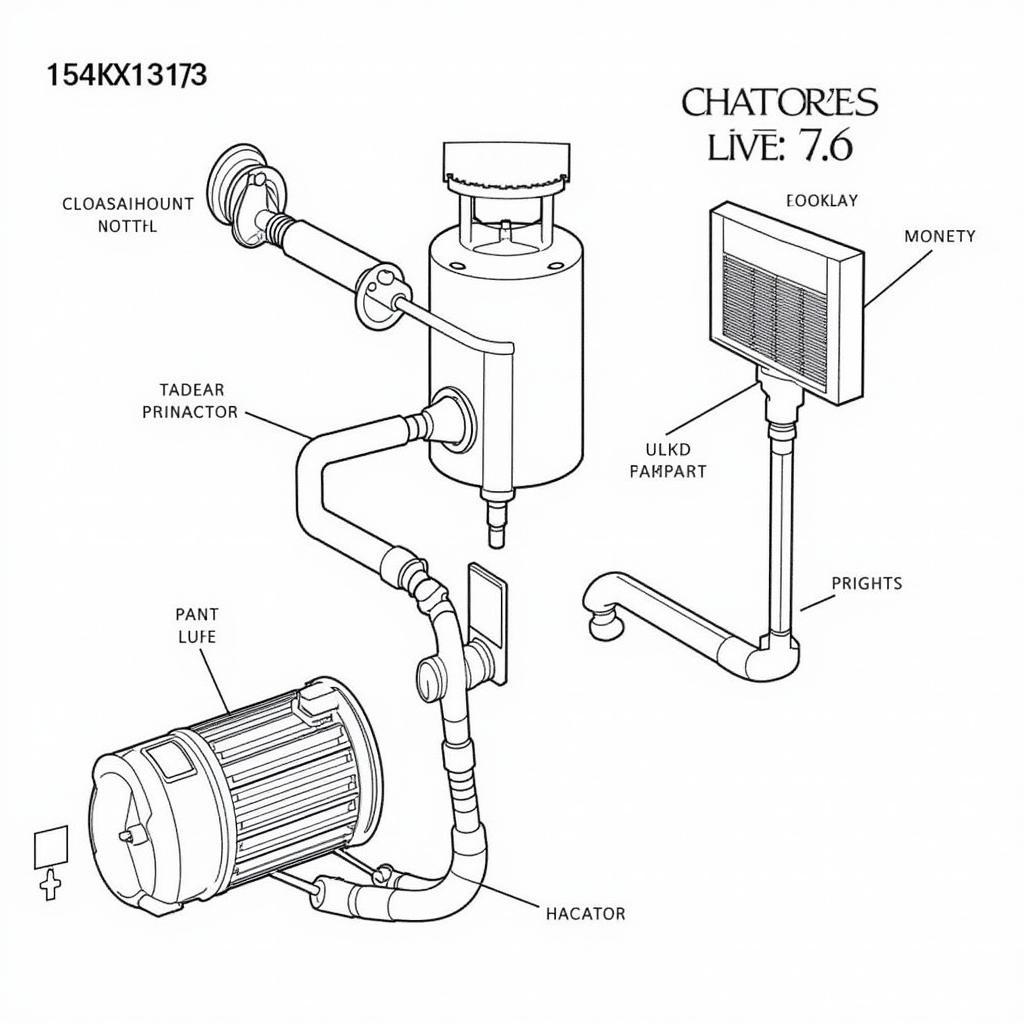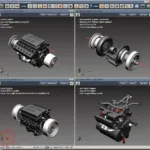When your car’s air conditioning system goes on the fritz, driving can quickly go from comfortable to unbearable, especially during the summer months. Understanding the importance of a well-functioning AC system and knowing when to seek professional air conditioning repair for your car can save you from discomfort and costly repairs down the road.
Why is Car Air Conditioning Repair Important?
A properly functioning car AC system does more than just keep you cool. It also:
- Improves driving safety: By keeping you comfortable, the AC system helps prevent fatigue and improves focus while driving.
- Enhances air quality: The AC system filters out dust, pollen, and other pollutants, improving the air quality inside your car.
- Protects your engine: A well-maintained AC system can actually help your engine run more efficiently, saving you money on fuel.
 Car AC System Components
Car AC System Components
Common Signs You Need Car Air Conditioning Repair
Don’t suffer through another sweltering commute. Be on the lookout for these common signs that your car’s AC system needs attention:
- Weak airflow: If the air coming from your vents is barely a breeze, it could indicate a problem with the blower motor or a blockage in the system.
- Warm air instead of cold: This is often a sign that the refrigerant level is low, which could be due to a leak.
- Unusual noises: Grinding, squealing, or clicking sounds when the AC is running could indicate a problem with the compressor or other moving parts.
- Foul odors: Musty or unpleasant smells coming from the vents could be a sign of mold or bacteria growth in the system, requiring a thorough cleaning.
What Causes Car Air Conditioning Problems?
Several factors can contribute to car air conditioning issues:
- Refrigerant leaks: Leaks are one of the most common culprits, often occurring at hose connections, seals, or within the compressor.
- Electrical problems: Issues with wiring, fuses, or sensors can disrupt the AC system’s operation.
- Compressor failure: The compressor is the heart of the AC system, and its failure will result in a complete loss of cooling.
- Clogged condenser or evaporator: Dirt, debris, and insects can accumulate on these components, restricting airflow and reducing cooling efficiency.
Car Air Conditioning Repair: DIY vs. Professional
While some minor AC maintenance tasks can be done at home, most repairs require the expertise and specialized equipment of a professional mechanic. Attempting complex repairs yourself can lead to further damage and costly repairs down the line.
When to seek professional car air conditioning repair:
- Refrigerant leaks: Refrigerant is a hazardous material, and handling it requires proper training and equipment.
- Electrical issues: Diagnosing and repairing electrical problems in the AC system can be complex and dangerous.
- Compressor replacement: This is a major repair that involves specialized tools and knowledge.
DIY car air conditioning maintenance:
- Changing the cabin air filter: This filter removes dust and pollen from the air entering your car’s cabin. Refer to your owner’s manual for the recommended replacement interval.
- Visually inspecting belts and hoses: Look for signs of cracks, fraying, or leaks. If you notice any issues, consult a mechanic.
Choosing a Car Air Conditioning Repair Shop
When it comes to your car’s AC system, entrusting its repair to a reputable and experienced shop is crucial. Consider these factors when choosing a repair facility:
- Certifications and experience: Look for ASE-certified technicians with experience in car AC repair.
- Positive reviews and testimonials: Check online reviews and ask for recommendations from friends and family.
- Warranties: Reputable shops stand behind their work and offer warranties on parts and labor.
- Transparent pricing: Ask for a detailed estimate before authorizing any repairs.
car air conditioning repair kit
Tips to Prevent Car Air Conditioning Problems
Proactive maintenance is key to keeping your car’s AC system running smoothly and preventing costly repairs. Follow these tips:
- Run your AC regularly: Even during colder months, run your AC for a few minutes every couple of weeks to keep the system lubricated and prevent seals from drying out.
- Schedule annual AC inspections: Have your car’s AC system inspected by a qualified mechanic at least once a year, preferably in the spring before the hot weather hits.
- Keep your car clean: Regularly clean the exterior of your car, especially around the condenser, to prevent dirt and debris buildup.
Conclusion
A properly functioning car air conditioning system is essential for a comfortable and safe driving experience. By understanding the common signs of AC problems, knowing when to seek professional help, and following preventative maintenance tips, you can keep your cool on the road and enjoy a comfortable ride all year round.
Frequently Asked Questions about Car Air Conditioning Repair
Q: How much does it cost to recharge car AC?
A: The cost of recharging your car’s AC can vary depending on the type of refrigerant used and labor costs in your area.
Q: How often should I service my car AC?
A: It’s generally recommended to have your car’s AC system serviced at least once a year, preferably in the spring.
Q: Can I add refrigerant to my car AC myself?
A: Handling refrigerant is dangerous and requires specialized equipment. It’s best to leave this task to a qualified mechanic.
car air conditioning repair dartford
Q: How long does a car AC compressor last?
A: The lifespan of a car AC compressor can vary, but they typically last between 80,000 and 150,000 miles.
Q: Can a bad car battery affect the AC?
A: While a bad battery may not directly affect the AC system, it can cause electrical problems that may prevent the AC from working properly.
Need help with your car’s air conditioning? Our team of expert technicians is here to help. Contact us today via WhatsApp: +1(641)206-8880 or Email: [email protected]. We offer 24/7 customer support to keep you cool on the road.

